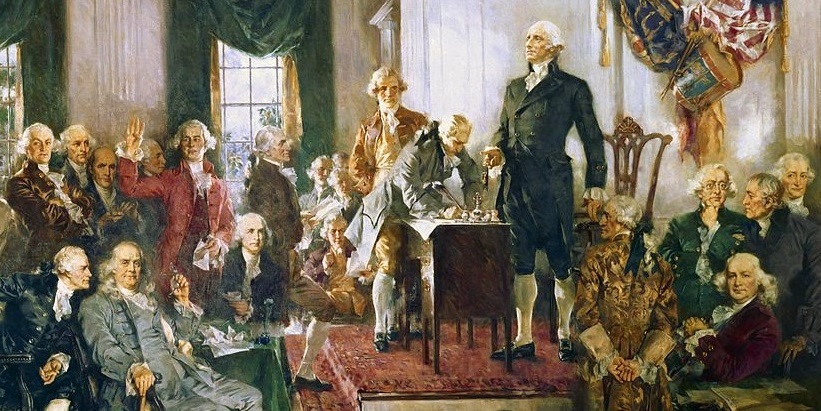The Republican Party has nominated a truly unusual candidate for President. More than any major party nominee in history, Donald Trump has spoken against the principles and policies of America’s Founding Fathers. He has opposed legal restraints on government power — laws that tie the government’s hands — which for the Founding Fathers provided the bedrock of freedom. And he has advocated open, overt religious discrimination, rejecting another of the Founding Fathers’ core values. Mr. Trump and his supporters aren’t necessarily unpatriotic. Most probably don’t realize they stand against the legacy of George Washington, John Adams, Benjamin Franklin, and the other founders. But as voters, we need to understand the Founding Fathers and the cornerstones they laid for our democracy.
Mr. Trump’s conduct on TV has led me to doubt that has the emotional balance or knowledge to succeed George Washington. But his responses to the Founding Fathers’ legacy raise more serious concerns.
1. Legal Restraints on Government Power. Nothing united the Founding Fathers more than their insistence that the law restrain government power, and they crafted a Constitution to protect liberty by imposing those restraints. Nearly all the founders spoke again and again on this theme, but George Washington probably did more than any of them to limit government power. He served as a living example of restraint when he led the nation, confirming for posterity that the law would check even America’s powerful presidency. Yet this year, the Republicans’ nominee for that same office has repeatedly scorned legal restraints on government power, calling them “politically correct,” and promised to break the law. Donald Trump has promised to violate NAFTA — a treaty, and thus a law: “[w]e will either renegotiate it or we will break it.” He has promised torture — to “bring back a hell of a lot worse than waterboarding” — and he’s said he’ll assassinate suspected terrorists’ families. And in praising Saddam Hussein, he said: “He killed terrorists. … They didn’t read them their rights … they were a terrorist, it was over.” Mr. Trump’s disdain for reading rights — a Constitutional requirement — tells us much about how he’d approach the Founding Fathers’ legacy. Even if he kept few of his promises or none, Donald Trump’s election would stand as a statement that American voters no longer agree with John Adams that ours should be, “a government of laws, and not of men.”
2. Religious Rights. George Washington said that, “in this land of equal liberty, it is our boast, that a man’s religious tenets will not forfeit the protection of the laws ….” Samuel Adams said, “[i]n regard to religion, mutual toleration in the different professions thereof is what all good and candid minds in all ages have ever practiced ….” Thomas Jefferson believed, “that religion is a matter which lies solely between man and his God, that he owes account to none other for his faith or his worship, [and] that the legislative powers of government reach actions only, and not opinions.” The list of Founding Fathers’ proclamations goes on and on. But today’s Republican nominee has called for open, overt discrimination against a religious minority, Muslims, in immigration and elsewhere. Some past Presidents probably practiced religious discrimination, but not recently (so far as we know) and not openly. The election of a President who openly advocates religious discrimination would reject the Founding Fathers’ guidance, on one of their central themes. (Mr. Trump’s election would also likely increase the very threat he means to address, since it’s because most Muslim citizens feel American — for now — that we’ve suffered fewer homegrown Islamist attacks than the less welcoming Europeans.)
The likely alternative to Donald Trump is Hillary Clinton. She’d be America’s first female President, and she inspires unusually positive and negative feelings among voters. Yet she’s far more a traditional candidate than Mr. Trump. That’s because she does not oppose the Founding Fathers’ legacy. Thanks to that difference, Secretary Clinton has attracted support from a large collection of Republican leaders. As former Reagan spokesman Doug Elmet put it: “I’ve never voted for a Democrat in my entire life,” but “I could live with four years of Hillary Clinton before I could ever live with one day of Donald Trump as president.” Only a few of these Republicans have cited the Founding Fathers, but it’s the founders’ legacy that creates this unusual alignment between Republicans and Democrats.
The founders’ legacy, however, doesn’t call on voters to cast a ballot for Hillary Clinton. Libertarian Gary Johnson stands just as much in line with the Founding Fathers, and so do other minor party candidates, as well as potential write-ins (Ted Cruz, Bernie Sanders, John Kasich, Marco Rubio …). It’s Donald Trump who stands apart from the Founding Fathers.
This presidential election’s central choice, then, is not between or among candidates. It’s between the trail blazed by the Founding Fathers and the path they warned us not to take.


Scary. Terrifying that many Trump supporters think that they are the real Americans.